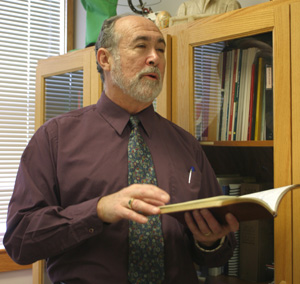When he was a physics major at Boston College in the ’60s, Paul Hamill worried about formulas and equations. But as the Tompkins County Poet Laureate for 2007, the director of academic funding and sponsored programs now thinks in similes and metaphors.

“Poetry is often a private experience for so many people,” he said. “[Having a poet laureate for the county] says so much about the appreciation of art in the community.”
While the title of poet laureate is an honor traditionally reserved for statewide and national levels, Tompkins County’s committee for economic workforce and development established the position in 2002 to recognize a writer who frequently publishes or performs poetry and takes an active interest in the art community.
Michelle Berry, a former assistant professor of public relations, served two years as poet laureate and supported the review committee’s choice.
“He’s wonderful,” she said. “I know Paul’s work. He’s very respected and well-loved by his community.”
Hamill is the county’s third poet laureate since the position was introduced, and all three have been faculty of the college. The first was Katharyn Howd Machan, associate professor of writing, followed by Berry, who both served for two years.
Hamill said it was unintentional that the three poet laureates are from the college, but that it makes sense.
“Ithaca College has a lot of artists across the board,” he said. “And it’s true that all three of us have strong involvement in the arts in the community.”
Hamill said he finds the contrast between his writing and administrative work satisfying. Even in school, his educational focus was not on writing, so Hamill said it took him some time to learn the craft.
“I was awful at first,” he said. “It took me a few years of practice to get good at it.”
Hamill came to Ithaca College 20 years ago as its first associate provost after teaching
English at institutions in Pennsylvania, Georgia and Indiana, and worked as an administrator in South Carolina. The honor of being named poet laureate is the most recognition his writing has received so far.
Hamill’s poetry was first published when he was in graduate school at Stanford University, which he said was his initial contact with the art community.
Hamill learned that his poetry was best when he stuck to simple subject matter and style.
“It’s when I tried to be fancy and poetical that the writing turned out awful,” he said.
Hamill said he writes about “mundane” topics such as road construction and Cub Scout meetings because poetry is his way of thinking about life.
“In writing, I am more truthful with myself and about issues with life than I am in
day-to-day thinking,” he said. “I am often surprised by what comes out in my writing.”
Poet laureates are expected to spend their terms participating in public readings and staying actively involved in the art community. Though Hamill hasn’t finalized a schedule for the year, he plans to visit the secondary schools in the district and focus on his senior audience.
Hamill stays active in the art community as a board member of the Community Arts Partnership and the Ithaca City of Asylum. The Community Arts Partnership is a county-wide alliance of corporations, universities, art organizations and local government.
Hamill is also involved in the City of Asylum, an international organization that grants residency and a stipend to exiled writers. Ithaca was the second city in the country to participate in the asylum, and Hamill joined the organization shortly after its founding.
Barbara Adams, assistant professor of writing, has known Hamill for years through their work as board members for the City of Asylum.
“As a practicing poet, Paul has been involved in the arts community for many years,” she said. “He is a very generous person and a very generous writer.”
Hamill said he is excited about the general acceptance of poetry into the community.
“Freedom of expression for artists is an important aspect of freedom thought for everyone,” he said. “Suppression of artists is usually an indication that government is trying to suppress human rights.”
Hamill credited Ithaca as being appropriate for a City of Asylum because of the nature of a college town.
“There are so many young people here who enjoy the arts and want to explore them,” he said. “It makes for an appreciative audience that is not afraid to try out new things in the arts. This is a good place for writers.”







